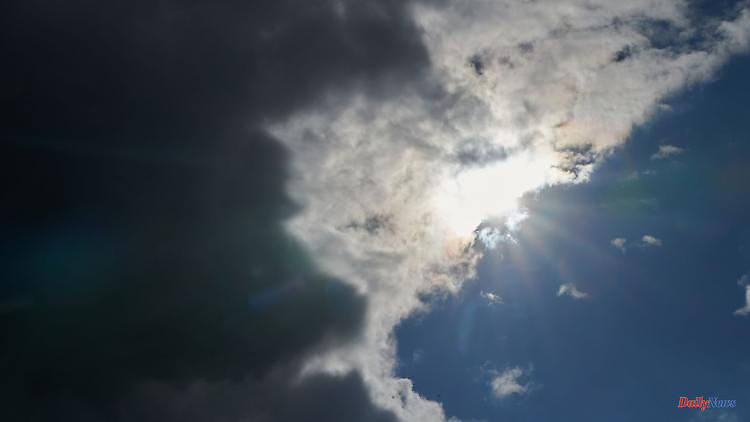Even a little carelessness can start a fire in a dry forest. Many fire brigades in NRW felt this. Now it's raining again - but that's causing problems for the parched ground again.
Essen/Düsseldorf (dpa/lnw) - After the hottest day of the year so far, people in North Rhine-Westphalia had to prepare themselves for the next potentially dangerous weather phenomenon: thunderstorms and heavy rain. Storms were forecast for Thursday night, especially for the north of the state, as the German Weather Service (DWD) announced on Wednesday.
Experts considered local flooding at night to be possible, but information levels for water levels should probably not be exceeded. However, the precipitation at least reduces the risk of a problem that has occupied many fire brigades in NRW in recent days: forest fires.
The DWD expected increasingly intense thunderstorms, especially in the evening and Thursday night. There could be up to 70 liters of rain per square meter within three to six hours, it said. The focus of the heavy rain probably extends from the Ruhr area to the Münsterland.
The flood information service of the State Office for Nature, Environment and Consumer Protection (Lanuv) announced that due to the predominantly dry soil, a reduced water absorption capacity is to be expected, and heavy rain could cause local flooding and run-off. According to Lanuv, peaks are to be expected in the Lower Rhine, Münsterland and Teutoburg Forest regions.
In smaller bodies of water, local thunderstorms could cause overflow and flooding. Rising water levels must also be expected for larger bodies of water in NRW. In extreme cases, the level of the Berkel near Ammeloe could rise by one meter and the level of the Lippe near Leven by one and a half meters. However, this would still not have reached the first level of information, at which the public is warned of escalation.
Long-lasting drought had previously caused an accumulation of forest fires in NRW. On Tuesday alone, seven fires were registered, the NRW Ministry of Agriculture announced on Wednesday in Düsseldorf. There have been a total of eleven fires since last Saturday, while there had been no fire in the forest in the almost four weeks before. In the current year - apart from the many fires of the past few days - there have been few forest fires compared to previous years. In 2019 there were 95 fires. In 2020 there were 227, in 2021 there were 79.
The forest fire hazard index recorded a high level of danger throughout NRW on Tuesday and Wednesday, in parts of the Münsterland and in Ostwestfalen-Lippe there was even the highest warning level 5 on Wednesday – i.e. “very high risk”.
At Sundern in Sauerland, emergency services were still dealing with a fire in a mixed forest that broke out on Tuesday. According to a fire department spokesman on Wednesday, the affected area was more than 50,000 square meters. That's about the size of seven soccer fields. Changing winds made the work difficult, and police helicopters with extinguishing tanks provided aerial support. The fire was probably prevented from spreading further with aisles milled in the forest, he said.
Forest fires also broke out in Attendorn, Hennef in the Rhein-Sieg district, Plettenberg in the Märkisch district and in Detmold on Tuesday and Wednesday night. According to the police, a field in Jülich burned in an area that corresponded to about 16 football pitches. On Wednesday there was a fire in a forest near Iserlohn. "We support the extinguishing measures with several helicopters and record Lennewasser," the police said on Twitter.
The rain on Thursday night is also noticeable in the forest fire risk index: it then recorded “very low risk” again for Thursday and for the whole of NRW.
The drought also severely restricts the business of cargo ships on the Rhine and other rivers in Germany. "We are only allowed to transport about 50 percent of the amount that we could transport," said Roberto Spranzi, the board member of the German Transport Cooperative for inland shipping. River levels are currently low. Due to the smaller amount of cargo, the ships are lighter and not as deep in the water. The capacities are reduced, but the demand is still high.
On Tuesday it was very hot with temperatures of more than 36 degrees in North Rhine-Westphalia. The highest value was measured at 39.5 degrees in Duisburg-Baerl. Many people were drawn outside to the water. A 15-year-old boy drowned in a bathing lake near Kerken on the Lower Rhine. In Duisburg, the fire brigade continued to search with divers on Wednesday for a 33-year-old man who slipped off an air mattress and fell into Lake Masuria on Tuesday evening - he has been missing ever since. A story in an outdoor pool in the Lippe district ended well: a bather saved a motionless, three-year-old child from the water. The police are now looking for the stranger to thank him for his courageous intervention.
In Euskirchen, firefighters freed a small dog from a completely closed car. The weakened, slightly staggering animal got water immediately, the police said. The 34-year-old owner wanted to "just go shopping". She was reported for violating the Animal Welfare Act.
According to a spokesman for Autobahn GmbH Westfalen, there were also three major truck accidents on motorways within a few hours in the heat on Tuesday, which is unusually high. "We can imagine that's also due to the heat," he said. One should be aware that people may not be as attentive on the road as usual.












